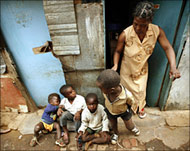Mandela chides US, Britain over Iraq
Former South African president Nelson Mandela has harshly criticised the United States and Britain over the war in Iraq, saying South Africa, by contrast, provided inspiration to the world.

In an address to parliament 10 years to the day after he was sworn in as South Africa’s first black president, Mandela referred to the international uproar over the publication of photographs of Iraqi prisoners tortured in Iraq.
“We live in a world where there is enough reason for cynicism and despair,” the frail-looking Mandela, 85, told a joint session of the house.
“We watch as two of the leading democracies, two leading nations of the free world, get involved in a war that the United Nations did not sanction.
“We look on with horror as reports surface of terrible abuses against the dignity of human beings held captive by invading forces in their own country,” he said to loud applause from the chamber.
“We see how powerful countries – all of them so-called democracies – manipulate multilateral bodies to the great disadvantage and suffering of the poorer developing nations,” Mandela said.
Mandela has been an outspoken critic of the US-led war in Iraq, even once describing President George Bush as “a president who can’t think properly” for his policy on Iraq.
Possible last speech
The Nobel Peace prize winner drew a contrast between the US and British failures on the world stage and South Africa, which this year is celebrating the 10th anniversary of the end of apartheid.
|
“We see how powerful countries – all of them so-called democracies – manipulate multilateral bodies to the great disadvantage and suffering of the poorer developing nations” |
“We should take heart from our own experience and performance. In a cynical world we have become an inspiration to many,” said Mandela.
“We signal that good can be achieved among human beings who are prepared to trust, prepared in the goodness of people.
“Let us refrain from chauvinistic breast-beating, but let us also not underrate what we have achieved in establishing a stable and progressive democracy.”
The address before parliament is seen as perhaps one of the last opportunities to hear Mandela as his aides have said old age is forcing him to cut back on his public appearances.
Major challenges
Members of parliament rose to their feet and clapped and cheered when the white-haired statesman walked into parliament with a cane, accompanied by his wife, Graca Machel, former first lady of Mozambique.
 |
|
Mandela drew attention to issues |
He praised his successor, President Thabo Mbeki, who last month led the African National Congress (ANC) to its largest election victory since 1994, saying he was the “embodiment of what our nation is capable of”.
But Mandela added that poverty, unemployment and AIDS were still major challenges.
“Our democracy must bring material fruits to all, particularly to the poor, marginalised and vulnerable. Our belief in common good ultimately translates into a deep concern for those that suffer want and deprivation of any kind,” he said.
South Africa has an unemployment rate of about 30%, while almost half of its population lives in poverty.
AIDS concern
It has one of the highest AIDS rates in the world with the United Nations’ AIDS agency estimating 5.3 million South African adults are infected, or about one in nine of the population.
“Nothing impairs the dignity of a person so much as not being able to find work and gainful employment. HIV/AIDS continues to threaten our future in a particularly frightening manner,” Mandela said.
He ended his address by saying: “God bless South Africa” in no fewer than six languages to spontaneous singing by lawmakers who rose to their feet.
Frederik de Klerk, South Africa’s last white president, who released Mandela from prison in February 1990 and scrapped apartheid laws, also addressed parliament, saying he had no regrets.
“I am paying tribute to all the men who helped to lay the foundations for the first 10 years. Together we all did the right thing,” De Klerk told the house.